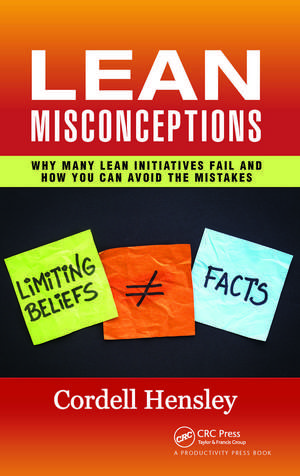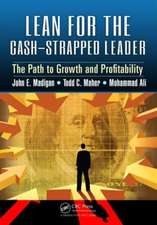Lean Misconceptions: Why Many Lean Initiatives Fail and How You Can Avoid the Mistakes
Autor Cordell Hensleyen Limba Engleză Hardback – 11 sep 2017
Lean Misconceptions: Why Many Lean Initiatives Fail and How You Can Avoid the Mistakes focuses on continuous improvement as well as the tools organizations can use to achieve long-term growth. Readers will gain new knowledge while also challenging their peers, seniors, subordinates, and their own thinking on Lean.
Preț: 214.71 lei
Preț vechi: 257.96 lei
-17% Nou
Puncte Express: 322
Preț estimativ în valută:
41.09€ • 43.93$ • 34.26£
41.09€ • 43.93$ • 34.26£
Carte tipărită la comandă
Livrare economică 17 aprilie-01 mai
Preluare comenzi: 021 569.72.76
Specificații
ISBN-13: 9781138217454
ISBN-10: 113821745X
Pagini: 176
Ilustrații: 22
Dimensiuni: 156 x 234 x 17 mm
Greutate: 0.39 kg
Ediția:1
Editura: Taylor & Francis
Colecția Productivity Press
Locul publicării:Oxford, United Kingdom
ISBN-10: 113821745X
Pagini: 176
Ilustrații: 22
Dimensiuni: 156 x 234 x 17 mm
Greutate: 0.39 kg
Ediția:1
Editura: Taylor & Francis
Colecția Productivity Press
Locul publicării:Oxford, United Kingdom
Public țintă
Professional and Professional Practice & DevelopmentCuprins
Preface; Chapter 1: Misconceptions; Chapter 2: Why And How Do Companies Start Doing Continuous Improvement (CI) Activities?; Chapter 3: Where Should We Focus; Chapter 4: A Brief History Of Lean; Chapter 5 Dynamic Organizations; Chapter 6: The Principles Within Lean; Chapter 7: Making Problems Obvious; Chapter 8: Solving Problems; Chapter 9: Share; Chapter 10: Show; Chapter 11: What Next?; Appendix; Bibliography
Recenzii
"Many, many companies either fail with their Lean effort, or at least fail to achieve their desires. Yet the really good exponents continue to thrive, and the more others try to copy them, the bigger the gap seems to get. Many authors have covered this, but many seem to ‘miss the mark" as they still focus on tools, often offering new ‘silver bullets’. Others focus on avoiding tools, focusing instead on Principles / Systems Thinking, etc. Cordell weaves a thread between these two camps, not seeking to elevate or undermine either, but instead highlighting the importance of an organisation's willingness to ‘learn’ as the real issue.
He tells us that we should call problems, problems (contrary to fashionable thinking) and use the solving of these problems to actually learn something valuable. He tells us that business leaders need to become ‘coaches’ to help their people do this, and to share and build on this learning continually. And he provides some sounds advice on how to go about doing this. Cordell makes a compelling and powerful case about how we should all remember our role as ‘learners’ in life. Business leaders who want to succeed in improving their business, irrespective of whether or not they have a ‘Lean programme’ would be well advised to read this book!"
- Nigel Waring, Owner, TPS Coaching
He tells us that we should call problems, problems (contrary to fashionable thinking) and use the solving of these problems to actually learn something valuable. He tells us that business leaders need to become ‘coaches’ to help their people do this, and to share and build on this learning continually. And he provides some sounds advice on how to go about doing this. Cordell makes a compelling and powerful case about how we should all remember our role as ‘learners’ in life. Business leaders who want to succeed in improving their business, irrespective of whether or not they have a ‘Lean programme’ would be well advised to read this book!"
- Nigel Waring, Owner, TPS Coaching
Descriere
Lean Misconceptions: Why Many Lean Initiatives Fail and How You Can Avoid the Mistakes focuses on continuous improvement as well as the tools that organizations can use to achieve long-term growth. Readers will gain important knowledge while also challenging their peers, seniors, subordinates, and their own thinking on Lean.


















